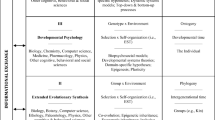Abstract
This paper presents evidence for a psychological coding process that meets the criteria that define such processes in organic nature and culture. The recognition of these previously unknown encoding sequences is derived from the recent formulation of an adaptive mental module of the mind—the emotion processing mind—that has evolved to cope with traumatic events and the unique, language derived, explicit human awareness of personal mortality. The emergent awareness of death has served as a selection factor for the evolution of a two-system, emotion-processing mind, with conscious and unconscious components, an arrangement that allows for the invocation of conscious denial, which in turn has fostered the use of encoding when faced with death-related traumas. The paper offers several ways in which evolved mental adaptations have features that are shared with those that are biological. Many aspects of these mental adaptive efforts are comparable to attempts at defense that are carried out by the immune system. In addition, the adaptive approach has been the foundation for the discovery of laws of communication, and thus of the mind, that are on a parallel with those found through mathematical models drawn from Newtonian physics.
Similar content being viewed by others
References
Barbieri, M. (2003). The organic codes. An introduction to semantic biology. Cambridge: Cambridge University Press.
Barbieri, M. (2010). On the origin of language. Biosemiotics, 4, 369–399.
Galileo, G. (1632). Dialogue concerning the two chief world systems (Translated by Stillman Drake). Berkeley: University of California Press. 1967.
Langs, R. (1996). The evolution of the emotion-processing mind, with an introduction to mental Darwinism. London: Karnac Books.
Langs, R. (1999). Psychotherapy and science. London: Karnac Books.
Langs, R. (2010). Freud on a precipice. How Freud’s fate pushed psychoanalysis over the edge. Latham: Jason Aronson.
Langs, R., Badalamenti, A., & Thomson, L. (1996a). The cosmic circle. The unification of mind, matter, and energy. Brooklyn: Alliance Publishing.
Langs, R., Badalamenti, A., & Savage-Rumbaugh, S. (1996b). Two mathematically defined expressive language structures in humans and chimpanzees. Behavioral Science, 41, 124–135.
Author information
Authors and Affiliations
Corresponding author
Rights and permissions
About this article
Cite this article
Langs, R. An Archetypal Mental Coding Process. Biosemiotics 7, 299–307 (2014). https://doi.org/10.1007/s12304-014-9214-z
Received:
Accepted:
Published:
Issue Date:
DOI: https://doi.org/10.1007/s12304-014-9214-z




